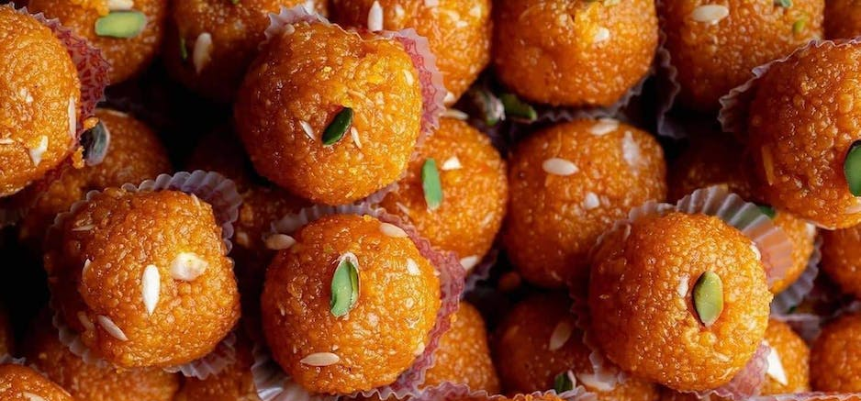10 Underrated Indian Sweets You Should Try

India, known for its rich culinary heritage, offers a plethora of sweet treats that tantalize the taste buds and leave a lasting impression. While popular Indian sweets like gulab jamun, jalebi, and rasgulla often take center stage, there are several underrated gems that deserve recognition. In this article, we embark on a delectable journey to explore ten lesser-known Indian sweets by delving into their history, preparation methods, and the sustainable packaging options used to preserve their flavours.
Modak
Originating from the state of Maharashtra, Modak is a delightful dumpling-shaped sweet made from rice flour and stuffed with a coconut and jaggery filling. This traditional delicacy is associated with Lord Ganesha and is often prepared during the festival of Ganesh Chaturthi. Modaks are steamed or fried and are typically served warm, making them a delightful treat to enjoy during the monsoon season. To promote sustainability, these sweets can be wrapped in eco-friendly paper cups or sustainable packaging options like banana leaves. A modak is best served with hot ghee
Chhena Poda
Hailing from the state of Odisha, Chhena Poda is a unique sweet made from fresh cottage cheese (chhena), sugar, cardamom, and ghee. The name “Chhena Poda” translates to “roasted cheese” in Odia. This delicacy is baked until it turns golden brown, resulting in a caramelised crust that contrasts beautifully with the soft and creamy interior. Chhena Poda is usually served in small portions, wrapped in banana leaves or sustainably sourced wrap sheets, adding to its appeal.
Malai Makkhan
Malai Makkhan, also known as Nimish, is a heavenly sweet from Uttar Pradesh. It is prepared by churning cream obtained from cow’s milk and adding sugar and saffron for flavour. The result is a luscious, fluffy dessert that melts in your mouth. Traditionally, Malai Makkhan is served in small earthen pots or clay cups, which not only enhance its presentation but also contribute to sustainable packaging practices.
Mysore Pak
Hailing from the royal city of Mysore in Karnataka, Mysore Pak is a popular sweet made from a combination of gram flour (besan), ghee, and sugar. The sweet’s history dates back to the reign of the Mysore kingdom. It has a distinct crumbly texture and a rich, buttery flavour that makes it irresistible. While Mysore Pak is usually cut into square or rectangular pieces, it can be packaged in sustainable paper cups to maintain its freshness.
Chikki
A beloved sweet snack from Maharashtra, Chikki is a combination of jaggery and roasted peanuts or sesame seeds. The ingredients are cooked together and then hardened into thin, brittle slabs that are perfect for munching on. Chikki is a great source of energy and is often enjoyed during festivals like Makar Sankranti. To maintain its crunch and preserve its flavours, Chikki can be packed in sustainable wrap sheets or reusable containers.
Bal Mithai
Originating from the hilly state of Uttarakhand, Bal Mithai is a unique and underrated sweet. It is made by frying khoya (reduced milk) balls until they turn brown and then coating them with sugar. This delectable treat is usually garnished with white sugar balls called boora. Bal Mithai is traditionally served in small paper cups or wrapped in eco-friendly packaging options, ensuring its flavours are preserved while reducing environmental impact.
Petha
A specialty from Agra in Uttar Pradesh, Petha is a translucent sweet made from ash gourd (also known as winter melon or white pumpkin) and sugar syrup. It comes in various flavours like plain, kesar (saffron), and angoori (with saffron and cardamom). Petha is usually packed in sustainable wrap sheets or paper cups, making it an eco-friendly option for sweet lovers.
Kolar Bora
Kolar Bora is a traditional Assamese sweet made from ripe bananas, rice flour, and jaggery. The ingredients are mixed together to form a batter, which is then deep-fried to create crispy fritters. Kolar Bora is often enjoyed during festivals and special occasions. To minimise waste, these fritters can be packed in eco-friendly paper cups or sustainable packaging alternatives, ensuring that the flavours are preserved while being kind to the environment.
Ghevar
A specialty from Rajasthan, Ghevar is a deep-fried disc-shaped sweet made from all-purpose flour, ghee, and sugar syrup. This intricate sweet is enjoyed during the festival of Teej and comes in various flavours like plain, malai (cream), and mawa (milk solids). Ghevar is traditionally served in circular shapes and can be packaged in sustainable wrap sheets or paper boxes, maintaining its unique form and taste.
Patoli
Patoli is a sweet delicacy from the coastal state of Goa, usually prepared during the celebration of Ganesh Chaturthi. It is made by stuffing a mixture of jaggery, grated coconut, and cardamom into turmeric leaves, which are then steamed. This traditional sweet is not only flavorful but also visually appealing, with the turmeric leaves imparting a vibrant hue to the dish. To ensure its freshness, Patoleo can be packaged in sustainable wrap sheets or eco-friendly containers.
India’s diverse culinary landscape boasts numerous underrated sweets that are often overshadowed by their more famous counterparts. From Maharashtra’s Modak to Goa’s Patoli, each of these lesser-known Indian sweets has a unique history, preparation method, and association with its respective region. Moreover, sustainable packaging options like paper cups, wrap sheets, and reusable containers can help preserve these traditional Indian sweets while reducing environmental impact. Ecopack is a pioneer in manufacturing sustainable packaging solutions like paper cups, paper bags, wrap sheets, etc. Check out Ecopack’s range of products here!
So, the next time you have a craving for something sweet, venture beyond the usual suspects and explore the underrated Indian sweets for a truly delightful experience.
QUICK LINKS
PRODUCTS
CUSTOMER CARE
For any information send an email to our Customer Service or contact us via social networks.
info_india@ecopack.com hr@ecopack.comDownload App
© 2023 ECOPACK INDIA PAPER CUP PVT. LTD.


